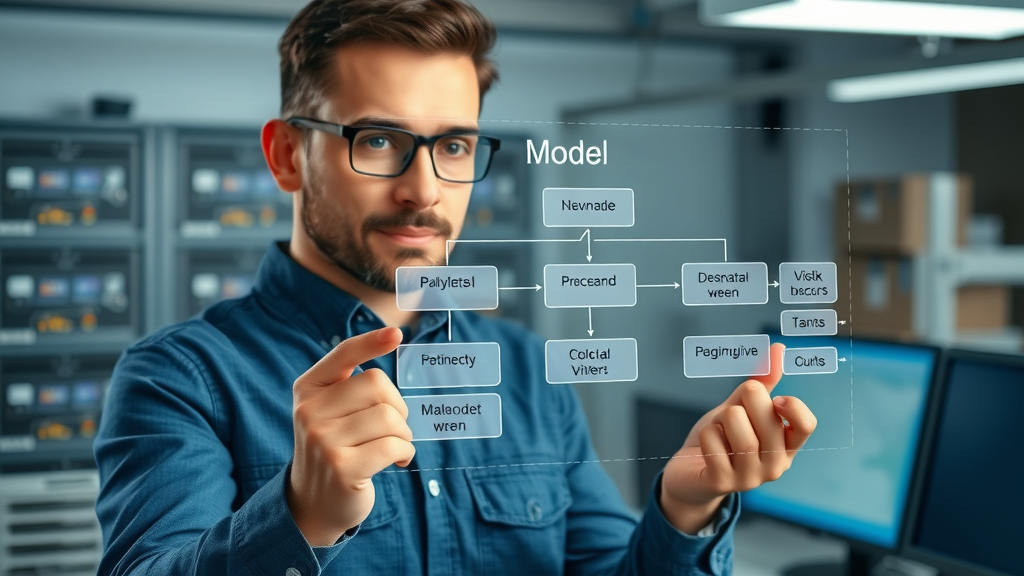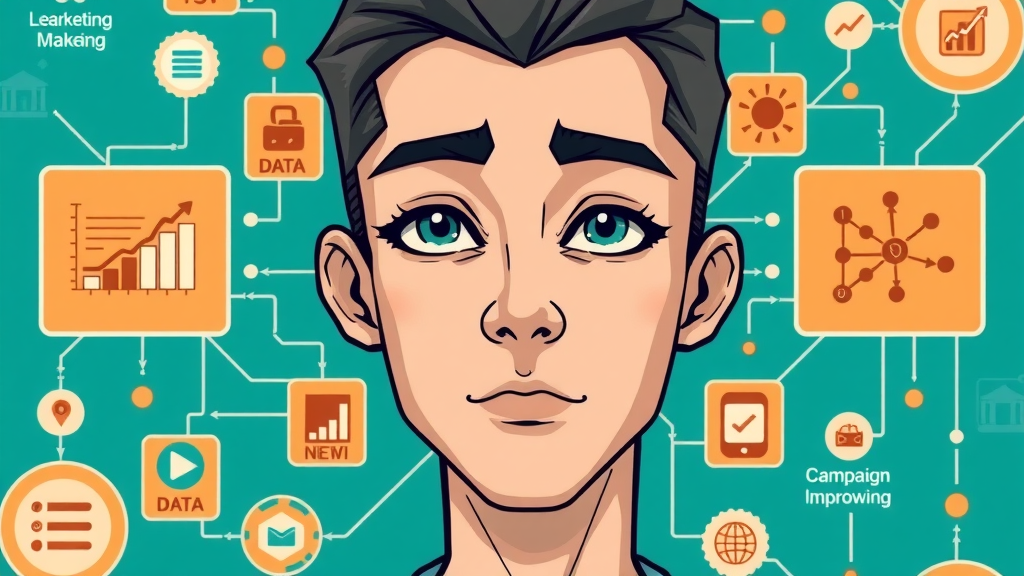Did you know that organizations utilizing machine learning for marketing have witnessed an average increase in ROI of up to 30% within just twelve months? As the digital marketing world races forward, the brands embracing machine learning are outpacing competitors with innovative campaigns, unmatched customer engagement, and data-driven marketing strategies that deliver real, measurable results. In this comprehensive guide, you’ll discover how harnessing the power of machine learning for marketing can unlock unprecedented growth—no matter your industry or audience.
Machine Learning for Marketing: Unlocking the Future of Digital Marketing

- Discover how machine learning for marketing is revolutionizing the industry: Recent studies show organizations leveraging machine learning for marketing increase their ROI by up to 30% within a year.
- Explore unconventional uses of data and AI making brands stand out in digital marketing.
As digital marketing evolves, machine learning for marketing is shaping a new frontier for brands ready to innovate. Companies of all sizes are finding that advanced analytics and AI-powered models allow them to understand customer behavior, predict outcomes, and craft more targeted marketing campaigns. Whether you’re seeking smarter customer segmentation or real-time content optimization, machine learning models empower marketers with the precision and agility necessary in today’s competitive environment. Practical examples, such as predictive lead scoring and automated content curation, highlight how machine learning in marketing can elevate results and revolutionize digital engagement.
By analyzing vast amounts of customer data and leveraging advanced learning models , machine learning offers marketers unprecedented opportunities to connect with target audiences. Not only is customer engagement improved, but campaign costs are also optimized, driving conversion rates higher than ever before. As customer experience becomes a central focus, those equipped with the right machine learning strategies are positioned to lead the pack in the new era of digital marketing.
Your Essential Guide to Machine Learning for Marketing Excellence
- Deep understanding of key learning models
- How to integrate machine learning in digital marketing campaigns
- Proven marketing strategies powered by artificial intelligence
- Insights into real-world case studies and best practices
Ready to become a leader in digital marketing transformation? This guide breaks down everything you need to know about integrating machine learning in marketing. You’ll learn about the primary types of learning models, actionable steps for deploying them in digital campaigns, and how innovative brands use artificial intelligence to deliver superior customer experiences . With insights into case studies and best practices, this roadmap empowers you to design strategies that increase customer engagement , foster higher customer satisfaction , and boost your ROI.
As you advance through each section, you’ll gain the skills to identify which machine learning models are best suited to your unique marketing needs. From automating tedious data tasks to personalizing every aspect of your messaging, adopting machine learning in marketing isn’t just a competitive advantage—it’s quickly becoming an industry necessity.
The Evolution of Machine Learning in Marketing: From Data Analysis to Dynamic Campaigns

How Digital Marketing Changed with Machine Learning
- Examine the intersection of artificial intelligence, data analysis, and marketing strategies.
- Timeline of notable advancements
- The growth of machine learning models in customer-centric marketing
Digital marketing has undergone a dramatic shift thanks to machine learning . Traditionally, marketers relied on manual data analysis, intuition, and broad demographic categories to reach audiences. Today, AI and machine learning models process colossal datasets to uncover patterns in consumer behavior , extracting actionable insights at unimaginable speeds. The leap from static reports to dynamic, data-driven campaigns allows marketers to anticipate trends, optimize strategies in real time, and customize messages with laser precision.
The timeline of major advancements in machine learning for marketing begins with early adoption in data analysis tools, evolving into technologies that drive customer segmentation , personalized recommendations , and real-time campaign adjustments. As predictive learning models and deep learning matured, applications expanded—from automating content distribution to optimizing ad spend and even real-time bidding in programmatic advertising. Each breakthrough in learning models made marketing efforts more adaptive and effective, ensuring marketers stay ahead in identifying shifts in customer expectations and market trends .
At the intersection of technology and creativity, the rise of advanced marketing strategies fueled by AI and machine learning in digital marketing means every touchpoint—email marketing, social ads, content creation—can be personalized, measured, and improved. This evolution places data analysis at the heart of every successful modern marketing campaign, turning raw information into strategic advantage.
Core Concepts: What is Machine Learning for Marketing and Why Does It Matter?
Understanding Learning Models and Their Impact on Marketing Campaigns
- Defining machine learning for marketing
- Explaining supervised, unsupervised, and reinforcement learning in marketing contexts
- How machine learning models support marketing campaigns and data analysis
At its core, machine learning for marketing refers to the application of algorithms that learn from historical data to predict patterns, automate decisions, and optimize marketing campaigns . Three primary learning models drive these innovations: supervised, unsupervised, and reinforcement learning. Supervised learning leverages labeled data to predict customer behaviors, such as purchase likelihood or churn. Unsupervised learning identifies hidden patterns in unstructured data, perfect for tasks like customer segmentation . Reinforcement learning, meanwhile, empowers systems to test strategies and adapt continuously, boosting campaign performance through trial and feedback.
By integrating these learning models, marketing teams gain intelligent systems that adapt to changing trends, unify insights across customer data , and uncover new growth opportunities. The impact on marketing campaigns is immense: they become more responsive, personalized, and efficient. With supervised learning, email marketing timing and content optimization are fine-tuned for maximum open and conversion rates. Unsupervised learning discovers novel audience segments, while reinforcement models keep efforts agile, adjusting strategies in real time based on performance signals.
As machine learning models continue to evolve, their influence on data analysis and campaign effectiveness grows. These learning algorithms bridge the gap between massive, complex datasets and practical marketing strategies —enabling marketers to identify patterns, predict outcomes, and create hyper-personalized experiences with unmatched speed and accuracy.
Key Machine Learning Models Used in Digital Marketing

- Regression models for forecasting
- Classification models for targeting
- Clustering models for customer segmentation
- Deep learning techniques for personalized customer engagement
In the realm of digital marketing , marketers deploy a variety of machine learning models depending on the goal. Regression models are key for forecasting sales, predicting lead scores, or estimating customer lifetime value (LTV). These models help businesses anticipate demand shifts and optimize budgets. Classification models are essential for targeting—whether to predict churn, identify likely converters, or detect fraud in advertising. Clustering dominates when it comes to customer segmentation , allowing brands to group individuals based on behavior, preferences, or needs, which drives customized messaging.
Deep learning has further expanded what's possible, especially in crafting personalized customer engagement strategies. Neural networks analyze massive datasets to personalize content, recommend products, or even create adaptive chatbots that understand natural language. By intertwining these models and analytics, marketers can go beyond surface-level data to anticipate customer needs and deliver one-to-one experiences at scale. Each model—regression, classification, clustering, and deep learning—brings unique strengths, fueling smarter, more predictive, and more engaging marketing efforts .
| Model Type | Application | Strengths | Use Case |
|---|---|---|---|
| Regression | Lead scoring | High accuracy | B2B sales |
| Classification | Churn prediction | Customizable | SaaS marketing |
| Clustering | Customer segmentation | High scalability | E-commerce |
| Neural Networks | Personalization | Advanced insights | Email marketing |
Transforming Customer Engagement with Machine Learning for Marketing
Revolutionizing Customer Segmentation and Personalization

- Utilizing machine learning for marketing to create dynamic customer segments
- Personalized content at scale
- Boosting customer satisfaction and experience
Customer segmentation has been completely transformed by machine learning for marketing . Unlike manual grouping, machine learning algorithms rapidly analyze purchase history , web activity, and customer data to uncover deep customer segments that marketers might otherwise miss. These dynamic segments enable precise targeting—delivering content, offers, and experiences tailored to each group’s unique interests and behaviors. As a result, brands achieve higher customer satisfaction and increased conversion rates, as messages resonate more powerfully with each audience segment.
Mass personalization, once considered out of reach for all but the largest brands, is now widely accessible thanks to scalable ML infrastructure. Marketers can create and deliver thousands of personalized messages or offers in real time, boosting engagement and fostering long-term loyalty. Machine learning models identify micro-trends within your audience and optimize outreach, ensuring every customer feels valued and understood throughout their journey.
By leveraging clustering and classification techniques, marketers not only improve campaign ROI but also unlock higher levels of customer experience . Personalizing at scale—without compromising on relevance or authenticity—is a key ingredient in the recipe for modern digital marketing success.
Customer Experience Redefined: From Data to Delight
- How machine learning for marketing enhances the customer journey
- Real-time recommendations
- Anticipating customer needs with predictive learning models
Machine learning for marketing doesn't just segment customers—it fundamentally redefines the entire customer journey. Predictive analytics and real-time recommendations empower brands to anticipate what customers need before they even ask. Think about personalized product suggestions, dynamically adapted web pages, or tailored support interactions, all made possible through analyzing historical data and live customer behavior signals.
The continuous learning process ensures that as new customer data flows in, models update and optimize outreach, eliminating static touchpoints in favor of evolving, personalized customer experiences. With predictive learning models, marketers can identify when a customer is most likely to convert, what content will resonate, and when to intervene to prevent churn. Each interaction thus feels personal, natural, and satisfying—dramatically increasing customer engagement while building authentic brand loyalty.
The impact? Brands move beyond basic automation into a space where every digital interaction is an opportunity to delight customers, exceed their expectations, and cement long-term advocacy.
Artificial Intelligence: Driving Customer Interactions and Retention
"Artificial intelligence is not the future – it’s the present. Brands leveraging machine learning for marketing see increased engagement and lifetime value." – Industry Leader
Artificial intelligence has shifted the landscape of customer interactions, providing marketers with intelligent assistants, chatbots, and automated recommendation engines that boost engagement and retention. By learning continuously from customer data and feedback, these machine learning models not only support marketing efforts but evolve them, leading to smarter, more conversational engagement experiences. The result: higher conversion rates, longer-lasting customer relationships, and a measurable lift in lifetime customer value.
Examples of AI in action include automated social media responses, real-time product recommendations, and dynamic loyalty programs, all powered by machine learning in marketing. This new breed of digital marketing strategy blends technology and empathy to keep customers coming back for more—transforming how brands interact and build connections in the digital age.
Machine Learning for Marketing Campaigns: Real-World Success Stories
Innovative Marketing Strategies: Case Study Collection
- Showcasing top brands using machine learning in marketing:
- Dynamic pricing in e-commerce
- Sentiment analysis in social media campaigns
- Automated content optimization

Marketing strategies powered by machine learning are delivering dramatic competitive advantages across industries. Leading brands like Amazon and Booking.com deploy dynamic pricing algorithms that respond instantly to market demand, inventory levels, and competitor movements—maximizing sales and profits. On social media, platforms use real-time sentiment analysis to tailor ad messaging, adjust spend, and predict viral content, resulting in far more engaging and relevant marketing campaigns.
Automated content optimization is another area where machine learning models excel. By continuously testing headlines, images, and calls-to-action, leading brands ensure each piece of content performs at its best for every visitor. These real-world examples showcase the versatility of machine learning in marketing, demonstrating how brands can pivot quickly, scale success, and achieve breakthrough performance with intelligent, data-driven strategies.
Each case underlines an essential truth: embracing machine learning isn’t just about staying relevant—it’s about seizing new opportunities to grow, innovate, and lead the market.
Ever wondered what a fully data-driven marketing campaign looks like behind the curtain? The process starts by collecting and cleaning customer data , followed by deploying advanced machine learning algorithms that identify patterns, forecast trends, and dynamically optimize every touchpoint. From automated segmentation to real-time ad adjustments, these campaigns showcase how machine learning transforms ideas into measurable outcomes, driving customer engagement and maximizing ROI.
Teams of marketers, analysts, and data scientists monitor campaign analytics in control centers—watching performance metrics evolve in real time and fine-tuning strategy based on live feedback. It’s a collaborative, fast-paced environment where machine learning for marketing provides the insights and agility required for digital dominance.
By going behind the scenes, marketers gain a deeper appreciation for the power of data, the precision of AI, and the creative possibilities unlocked when cutting-edge technology meets smart campaign strategy.
Optimizing Email Marketing with Machine Learning: Smarter Campaigns
How Machine Learning Models Supercharge Email Marketing
- Advanced segmentation and timing
- Predictive analytics for open and click rates
- Personalization engines in email marketing
Email marketing remains one of the most effective digital marketing channels, and with machine learning for marketing, it becomes even more powerful. Machine learning models analyze customer behavior —such as previous opens, clicks, and purchase history—to identify the optimal time and content for each recipient. These analytics ensure emails are highly relevant, timely, and personalized.
Using predictive analytics, marketers can anticipate which subject lines will drive the highest open rates, which products a user is most likely to purchase, and when a subscriber is likely to disengage. Personalization engines, powered by deep learning, automatically tailor offers and recommendations for every customer, boosting engagement and overall conversion rates.
With machine learning, your email campaigns move from generalized broadcasts to intelligent, adaptive experiences—resulting in increased ROI, better brand loyalty, and higher customer satisfaction every step of the way.
Example: Adaptive Email Marketing in Action

- Walkthrough: Deploying a machine learning model to drive a successful email campaign
Imagine a retail brand deploying a new product launch through email. By feeding historical engagement data—such as open rates, click-throughs, and conversion history—into a machine learning model, the marketing team segments customers into predictive groups. The model then decides in real time when each subscriber will most likely open their email and which offers will resonate best, ensuring maximum visibility and response for every send.
As the campaign rolls out, the model updates recommendations based on new data, dynamically fine-tuning segments, timing, and content. Open and conversion rates soar compared to previous manual efforts. This adaptive approach not only saves time and resources but consistently outperforms traditional campaigns, delivering measurable growth and insights for future marketing strategies.
The outcome? Increased engagement, greater revenue per campaign, and a continuously optimized customer journey—all made possible through the intelligent use of machine learning for email marketing.
Data Analysis, Customer Insights & the AI Advantage
Translating Data into Actionable Marketing Insights
- Learning in marketing: Setting up your analytics pipeline
- Best practices in data collection & cleaning
- Using machine learning for predictive metrics

To harness the full potential of machine learning for marketing , brands must master the art of data analysis . This process begins by establishing a robust analytics pipeline: collecting, cleaning, and organizing customer data from every touchpoint. Clean data is the foundation for accurate modeling—removing duplicates, standardizing formats, and filling in any gaps ensures learning algorithms work at their best.
Next, sophisticated machine learning algorithms translate raw information into actionable insights. Predictive metrics such as churn risk, customer lifetime value, and likely conversion rates empower marketers to make strategic decisions quickly and confidently. Real-time dashboards visualize these KPIs, allowing teams to act the instant opportunities arise or threats emerge.
When data analysis merges with advanced machine learning, marketing teams gain the actionable customer insights needed to optimize spend, sharpen targeting, and innovate faster—giving every brand a tangible AI advantage.
| Metric | Traditional Method | ML-Enhanced Method |
|---|---|---|
| Segmentation | Manual grouping | Automated clustering |
| Churn Risk | Basic scoring | Predictive modeling |
| LTV | Historic sales | Dynamic forecasting |
Marketing Strategies: Implementing Machine Learning for Marketing Effectively

Step-by-Step Guide to Integrating Machine Learning in Digital Marketing
- Define campaign objectives and KPIs
- Collect and structure data
- Choose and train the appropriate machine learning model
- Deploy and monitor performance
- Iterate for continuous optimization
Successfully implementing machine learning for marketing requires a strategic approach. Start by defining clear objectives and key performance indicators (KPIs) for your marketing campaign. Next, focus on data—collect high-quality information from your website, social channels, CRM, and past campaigns. Structure and clean this data, making it ready for model training.
Then, select the right learning model for the job—whether it’s regression for forecasting, classification for targeting, or deep learning for advanced personalization. After your model is trained, deploy it within your digital marketing workflow and closely monitor performance against objectives. Finally, commit to iterative improvement: as new data emerges, retrain your models, update strategies, and drive continuous optimizations that keep your marketing efforts ahead of the curve.
By following these steps, even organizations new to AI and machine learning can steadily build capabilities and realize measurable business impact.
Common Pitfalls in Machine Learning for Marketing—and How to Avoid Them
- Insufficient data and data quality
- Model overfitting or underfitting
- Misalignment with marketing goals
"The most valuable marketing insights often come from unexpected data sources, made accessible by machine learning."
Despite the benefits, there are common pitfalls to avoid when adopting machine learning for marketing. Insufficient or poor-quality data undermines results, leading to inaccurate predictions and suboptimal targeting. To counter this, prioritize comprehensive data collection and robust data cleaning practices from the outset.
Another challenge is model overfitting—where the model becomes too closely tied to historical data, reducing its ability to generalize to new situations—or underfitting, where the model is too simple to capture complex behaviors. Combat both by continually testing models on fresh data and refining parameters as needed.
Most importantly, ensure your machine learning initiatives are tightly aligned with your core marketing strategies and goals. Machine learning models must serve campaign objectives, not the other way around. With the right focus and attention to data integrity, marketers can avoid these pitfalls and reap lasting rewards.
Frequently Asked Questions about Machine Learning for Marketing
How can machine learning be used in marketing?

- Machine learning for marketing can automate data analysis, identify trends, segment customers, personalize content, and optimize marketing spend, enabling smarter, faster, and more profitable campaigns.
Machine learning automates the heavy lifting of data analysis in marketing, uncovering actionable trends and insights from customer data. It allows marketers to segment audiences, personalize campaign content, optimize budgets, and predict campaign outcomes. These capabilities streamline workflows, improve ROI, and provide a competitive edge in digital marketing .
Can I use AI for marketing?
- Yes, artificial intelligence and machine learning can be integrated across digital marketing strategies to streamline workflows, improve targeting, predict outcomes, and measure success.
Absolutely. Both AI and machine learning are now core components of effective modern marketing. Whether you are optimizing ad spend, automating social media, or delivering personalized recommendations, AI-driven processes help marketers achieve results more efficiently and with greater precision than ever before.
How does Coca-Cola use AI in marketing?
- Coca-Cola leverages machine learning for marketing by analyzing social data, optimizing media spend, personalizing content, and driving innovative campaigns with predictive analytics.
Coca-Cola is a pioneer in using AI and machine learning for marketing. By analyzing social media sentiment, automating content recommendations, and optimizing multi-million dollar ad campaigns, the company achieves deeper customer insights and higher engagement. Predictive analytics guide everything from creative messaging to distribution timing, fueling innovation, and improved ROI.
What is the best AI for marketing?
- The best AI for marketing depends on business needs, but leading platforms offer robust machine learning models that provide automation, personalization, data analysis, and customer engagement features.
The best AI for marketing hinges on your organization's needs and budget. Top platforms like Salesforce Einstein, Adobe Sensei, and Google Cloud AI provide a suite of machine learning tools—spanning data analysis, automation, personalization, and predictive insights—that can be tailored for any marketing strategy.
Expert Tips: Elevating Your Marketing Campaigns with Machine Learning
- Leverage customer segmentation for targeted messaging
- Optimize campaign timing with predictive learning models
- Continuously test and refine strategies based on machine learning insights

The fastest way to elevate your marketing campaigns is by applying expert best practices. Start by using machine learning to uncover granular customer segments and deliver targeted messaging that resonates. Use predictive analytics to determine the optimal timing and touchpoints for every outreach.
Never stop testing. Continuous experimentation and iteration, powered by machine learning models, surface surprising insights that can be rapidly applied to drive better results. Remember: in digital marketing, data is your secret weapon—the more you learn, the better you perform.
Lastly, cultivate collaboration between marketing and data science teams. Combined expertise ensures you not only interpret insights correctly but turn them into strategic actions that win over customers and build enduring brand loyalty.
Actionable Insights: Mastering Machine Learning for Marketing in Your Strategy
- Start with pilot campaigns using available data
- Invest in ongoing learning and upskilling
- Leverage cloud-based machine learning tools for scalability
- Collaborate with marketing and data science teams
"In the age of digital marketing, mastering machine learning gives marketers a competitive edge that’s hard to match." – Forbes
To fully harness machine learning in marketing, begin with small pilot projects that let you test models on real campaign data. Invest in training and upskilling for your teams, keeping pace with the fast-evolving AI landscape. Adopt cloud-based ML tools to ensure scalability as your campaigns grow. And above all, maintain a collaborative approach, matching marketing creativity with data science rigor to maximize results from every strategy.
As you refine your strategy, review model outcomes and continue innovating. The brands that learn fastest—and apply those lessons—are the ones that win big in the era of data-driven digital marketing.
Ready to Harness the Power of Machine Learning for Marketing?

- Embrace machine learning for marketing today to transform your digital marketing, outpace competitors, and deliver exceptional value to your customers. Begin your journey with actionable insights, cutting-edge tools, and a commitment to data-driven excellence.
Take the leap—start your journey into data-driven marketing excellence today!
To deepen your understanding of how machine learning is transforming marketing strategies, consider exploring the following resources:
-
“A Guide to Machine Learning in Marketing” : This comprehensive guide delves into various applications of machine learning in marketing, including customer segmentation, personalized recommendations, predictive analytics, and more. It provides practical insights into how these technologies can enhance marketing efforts. ( brandxr.io )
-
“Machine Learning in Marketing – Software Mind” : This article explores how machine learning is currently utilized in marketing, covering aspects such as customer segmentation, product recommendations, predictive analysis, ad targeting, content generation, and fraud detection. It offers a detailed look at the benefits and applications of machine learning in the marketing domain. ( softwaremind.com )
These resources provide valuable insights into the integration of machine learning in marketing, offering practical examples and strategies to enhance your marketing initiatives.
 Add Row
Add Row  Add
Add 




Write A Comment